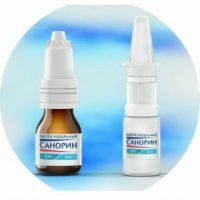
Pregnancy launches a radical restructuring of the woman's body, which entails the appearance of a variety of problems. One of them is congestion of the nose. The cause of this phenomenon lies not in catarrhal diseases, but in changing the hormonal background. To alleviate the condition of the patient are capable of vasoconstrictor drops in the nose, for example, Sanorin, often prescribed during pregnancy.
- Composition
- Form
- Indications
- Contraindications
- Usage
- In pregnancy
- Side effects
- Analogues
The difficulty of nasal breathing during pregnancy is highly undesirable. Lack of oxygen in the lungs leads to a lack of oxygen in the blood, which nourishes the baby. Hypoxia is very dangerous - it can lead to disruption of intrauterine development. Sanorin opens the nasal passages in one or two minutes and it seems that hypoxia is no longer threatened. But this is not so, the drug does not have a local, but a general vasoconstrictive effect. The blood passes through such vessels poorly, and hypoxia persists.
Composition
Sanorin contains naphasolin nitrate, which has a rapid and pronounced vasoconstrictor effect on the vessels of the nasal mucosa, the paranasal sinuses and the nasopharynx. As a result, the puffiness and redness of the tissues is reduced, which facilitates nasal breathing, at the same time the patency of eustachian tubes( auditory canals) is restored.
Form
Nasal drops and a spray with a concentration of 0,1%, which is prescribed for adults and children from 16 years of age. Children's drops with a dosage of 0.05% are prescribed between the ages of 2 and 15 years. There are varieties of the drug for the treatment of conjunctivitis, as well as the content of eucalyptus oil to enhance the effect.
to table of contents ^Indications
- Sinusitis.
- Sinusitis.
- Acute rhinitis of various origin.
- Allergic rhinitis.
- Average Otitis.
- Eustachyte.
- Laryngitis.
- With mucosal edema for diagnostic and therapeutic procedures.
Contraindications
- Chronic or atrophic rhinitis.
- Hyperthyroidism.
- Diabetes mellitus.
- High sensitivity to the drug components.
- Elevated blood pressure.
- Tachycardia.
- Treatment with MAO inhibitors or a period of less than 14 days from the day of its termination.
Application of
In pregnancy Sanorin is prescribed according to the following scheme:
- drops - up to two drops in each nasal passage three times a day;
- nasal spray - from one to three injections in each nasal passage three times a day.
There should be at least four hours between each use of the drug. A prerequisite is that the medicine should not get into the stomach. To comply with this rule, it is recommended to lubricate the nasal passages with Sanorin to relieve swelling.
The course of treatment is 7 days. If the condition has improved earlier, the drug is canceled. It is possible to reuse the medication after a break, but only after consulting a doctor.
to the table of contents ^In pregnancy,
The instructions to the drug do not explicitly prohibit the use of Sanorin during pregnancy. At the same time, no large-scale tests were carried out for this particular drug and its effect on the fetus was not reliably studied.
Therefore, treatment with Sanorin should be under the supervision of a doctor who knows all the features of the course of pregnancy. It is best to apply it in the early days of the common cold, when the swelling of the mucosa is great, and when any anxious symptoms appear, the drug should be immediately canceled.
Some women in pregnancy prefer to use Sanorin with eucalyptus or a child's dosage of the drug, but the effect is the same in any case.
to contents ^Side effects of
In case of overdose:
- irritation and dryness of mucosa;
- burning sensation in the nose;
- is very rare - nausea, vomiting, dizziness.
If sanorin is used uncontrolled or for a long time, there is a risk of edema of the nasal mucosa and further death of the tissues of the nasal cavity.
If a patient takes antidepressants or MAO inhibitors, simultaneous treatment with Sanorin can cause heart rhythm disturbances. For this reason, the prescribing physician should be informed of all medications before prescribing.
to contents ^Analogues
In pharmacies several analogues of Sanorina are sold on the active substance, which are dispensed without prescription:
- Nafazol
- Naphthysin
- Nafazoline
